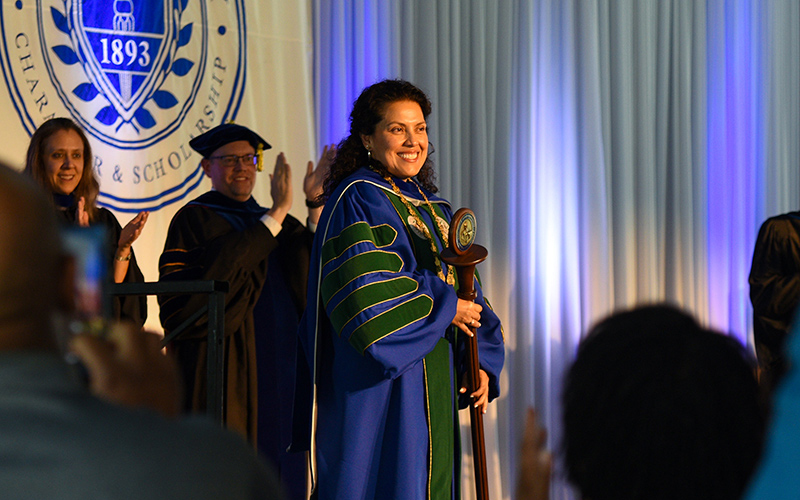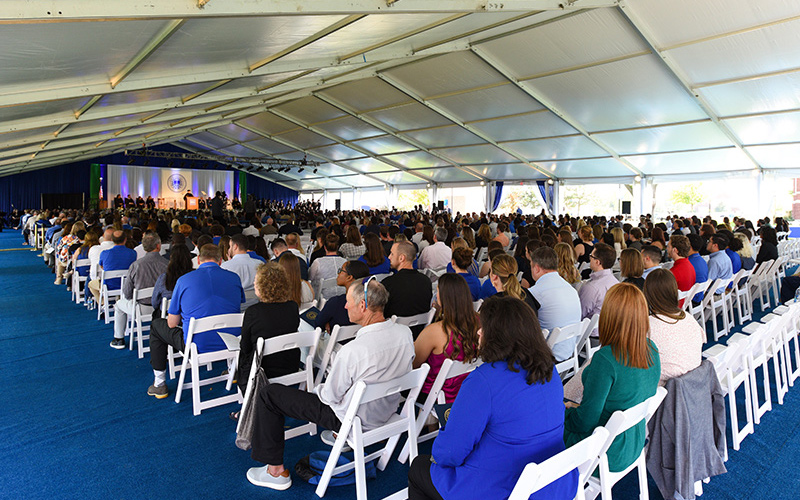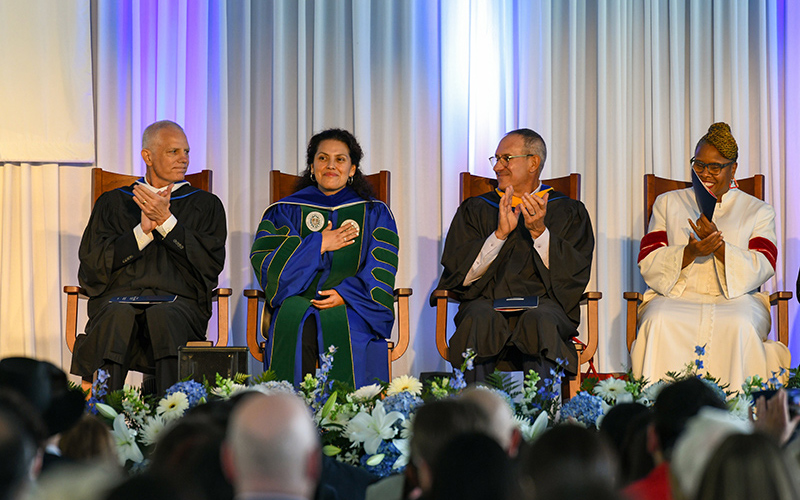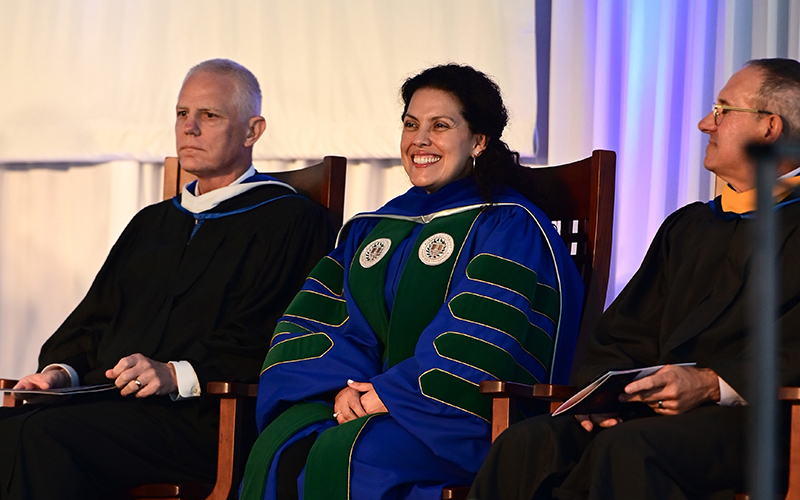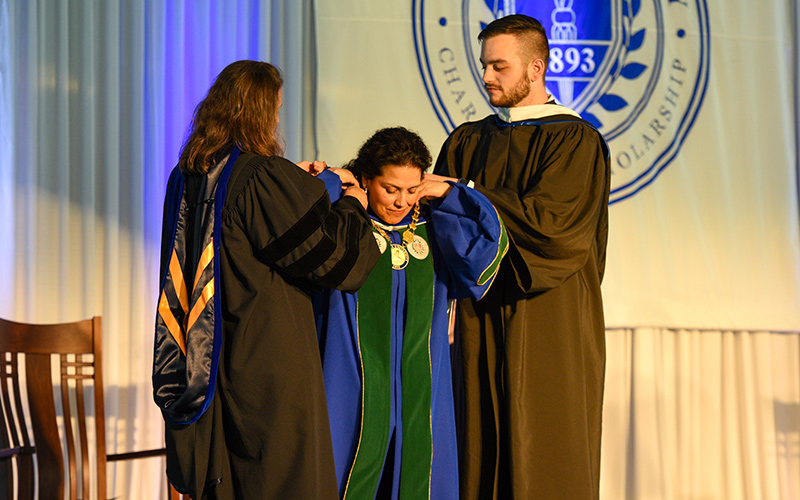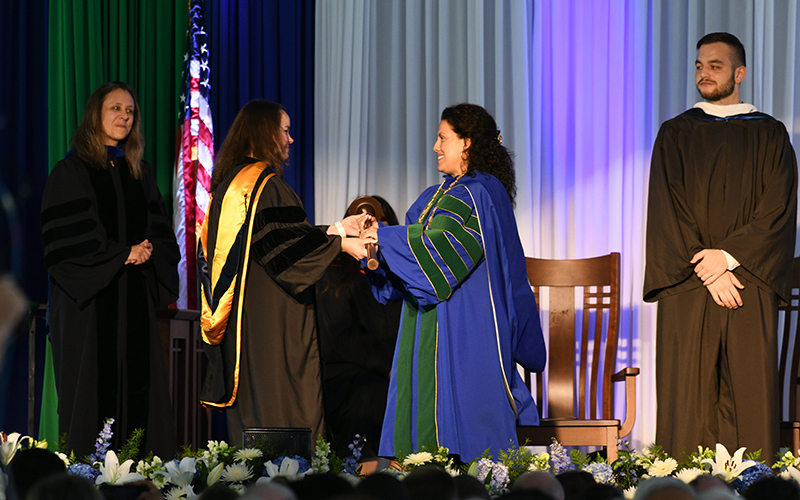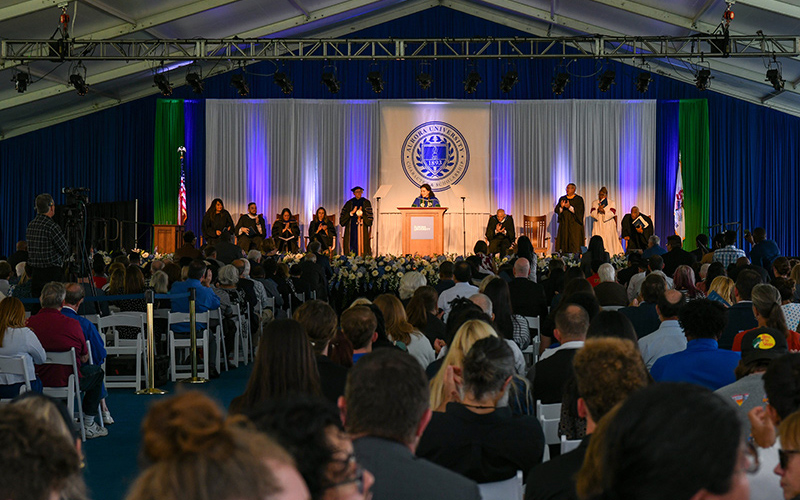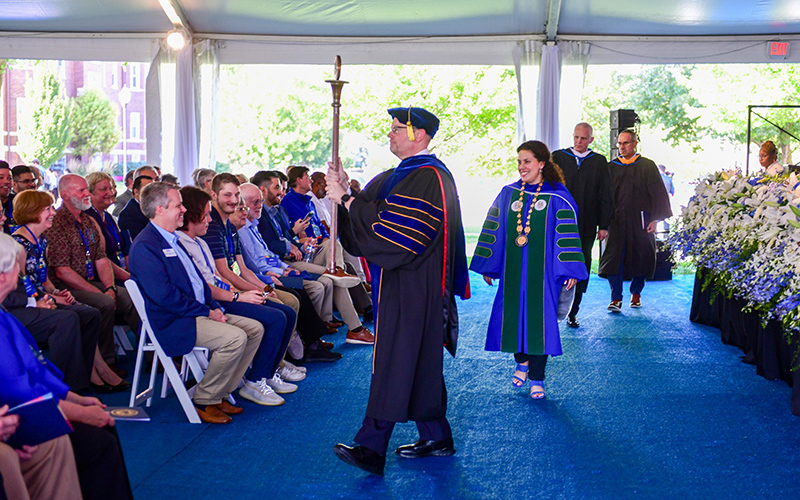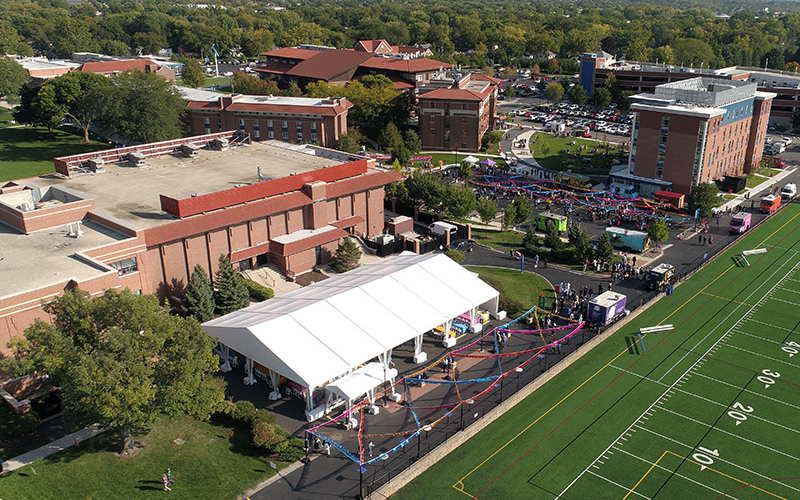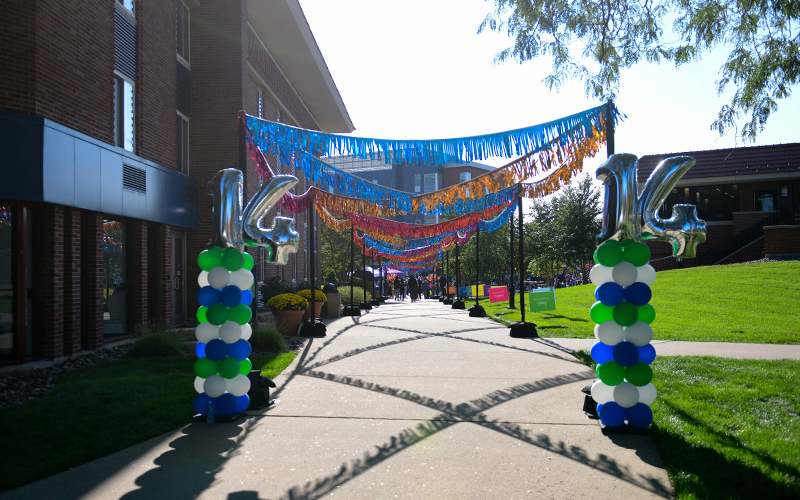Inauguration

The Inauguration of Susana Rivera-Mills, PhD
14th President of Aurora University
Friday, September 29, 2023 | 2 p.m. CT
University Quadrangle
347 S. Gladstone Ave., Aurora, IL 60506
Aurora University celebrated the presidential inauguration of Dr. Susana Rivera-Mills during Homecoming Weekend on Friday, September 29, with a ceremony on the Aurora campus. We invite you to join the AU community in commemorating this historic event by viewing the ceremony replay.
View the inauguration program.
Aurora University
September 29, 2023
Thank you very much. I am so moved by all the remarks, the beautiful music, and poetry reading that have been shared in this program.
I'd like to extend my heartfelt appreciation to my family and friends who made the trip to be here. My gratitude goes out to the trustees, my esteemed colleagues, AU students, and alumni. I take seriously your confidence in me, the trust bestowed upon me, and the work we will do together.
And to the delegates from peer institutions and to our elected officials from Aurora and the state of Illinois, thank you for being here today.
I also want to express my deepest gratitude for the many people that worked hard to ensure that every detail of this event was taken care of. Thank you for your hard work and for ensuring that the weather would cooperate.
It is rare that a person can experience a moment of time in which one’s past, present, and future intersect. At this moment, as I look over this quad full of people and see my family, my dear friends and colleagues, our students, our faculty and staff, our neighbors and community partners and leaders, I must pause and take a moment to experience the blessings of an abundant life, and of people who have lifted me and walked this journey with me, and I thank God for this opportunity to serve.
Indeed, my journey has been one of faith, perseverance, resiliency, and relationships. Along the way, I have been blessed with many people who crossed my path at the right place and at the right time to propel me to the next level of opportunity.
As many of you know, my personal journey began more than four decades ago when my parents decided to leave their home in El Salvador for the United States due to a civil war. That decision was rooted in the love and devotion to their family.
Unfortunately, my parents cannot be here today due to health concerns, but I know they are watching online: Mamá, Papá gracias por el valor que tuvieron de dejar nuestro país, gracias por su sacrificio y amor, gracias por guiarnos en la fe y plantar en nosotros la semilla del amor de Dios. Los quiero mucho, y este logro que ven es su logro y la bendicion de Dios para con Uds.
I also want to thank my brother, my nephew, Joseph, and my nephew, Carlos, who is representing our oldest brother, for their courage, strength, and their love and support throughout my life. I know that although our oldest brother is no longer with us, his love and spirit of joy continues.
Today we come together to celebrate Aurora University’s past and present, and to look ahead at our future promise. We do so with faith and confidence as a diverse community united by AU’s mission and dedication to the transformative power of learning.
More than 100 years ago, classes began here in Aurora, on a campus surrounded by prairie. Three stark buildings stood closely together — two dormitories — Wilkinson and Memorial, and one all-purpose building — Eckhart Hall, which stands behind me. It contained the office of the president, an assembly hall, the library, a museum, a gymnasium, and twenty-five classrooms.
The lower level accommodated the science department — featuring two laboratories, two storage rooms, three classrooms, and one office for faculty members to share. Fifty students were enrolled on the first day of classes on April 4, 1912.
Then-President Orrin Roe Jenks understood the future was not certain. Though he had convinced leaders of the Advent Christian Church, who had founded the college, to move the campus from Mendota to Aurora, Jenks knew that the early years of the college would be difficult. Success would depend on the attitude of the community — both on campus and in the city.
Choosing the city of Aurora as the college’s new location was a decision Jenks labored over — and prayed about deeply.
The city of Aurora in the early 1900s was emerging as a beacon of opportunity and promise. It was a growing city, one that provided a larger, and a more dynamic and diverse population. The city also offered employment in industry and manufacturing, medicine and education, and access to greater financial resources.
What especially attracted Jenks to Aurora was support from civic and business leaders who knew that the city and its residents would benefit immensely by having the university here.
Today, decades later, I stand in front of Eckhart Hall, named for Charles Eckhart, who as a youth was unable to complete his own education. Eckhart, a member of the Advent Christian Church and an Indiana businessman, believed so strongly in the importance of education, especially one rooted in faith, that he pledged $10,000 toward construction of the college’s main building (this would be about $322,000 in today’s economy).
I think about President Jenks and his decision to move to a city unknown to him and so different from where he had been living. I think about Eckhart and the faith that inspired him to give generously toward construction of a new campus. I pause again to think about my parents’ decision to emigrate, which took far more faith and courage than I could have understood at the time.
My parents, like many of your parents, grandparents, or great-grandparents, sacrificed much and worked hard to provide the next generation with greater opportunities and a safer environment.
My siblings and I benefited from that sacrifice and through education and hard work we have been able to move ahead. But this wasn’t an easy journey for any of us. I only began to think about a future when my high school Spanish teacher, Lucy Quinby, started asking me about college during the lunch hours that I would spend with her.
You see, I really didn’t fit in with the other students. I was different, dressed differently, ate different food, and wasn’t comfortable among my peers. So, I sought out Ms. Quinby’s class because that is where I felt safe and cared for.
It was there that she would often say to me — “Susy, when you go to college what would you like to study?” Soon, she had me dreaming of majoring in physics and being a thermonuclear physicist working for NASA, or working as a translator for the United Nations.
She made dreaming easy, for you see, she never said if you go to college. That one word — when, instead of if — instilled in me a belief that I could do whatever I could imagine. The potential she saw in me, became my reality.
Lucy, I know you are watching online, and I know it is not often that teachers hear a thank you from students once they graduate and move on. So, I would like to take this moment to say Muchisimas Gracias, por creer en mi. Thank you for believing in me and for taking the time so many years ago to show me how much you cared.
My journey has also been defined by all the students that have been part of my career as a professor, mentor, and guide. I have learned as much from them as hopefully they did from me. They are the ones that clarified for me what it means to be a leader. Shortly after being appointed Vice Provost for Student Success at Oregon State University, I ran into a group of my Latino students, they stopped me and said “Profe, we are so proud of you” I found that strange so I replied, “What do you mean you are proud of me? I’m the one that is proud of you!” and they said, “No, we are proud because you are up there — pointing to the building where my office was — “And now we know that you are representing us, and if you can do it, we can do it too.”
That was the moment that I understood that leadership had nothing to do with me and it was not about me anymore. It was about serving others and ensuring that those who could not be seated or included at the decision-making tables were at least represented.
Because of them, because of Ms. Quinby, along with the love and support of my parents, family, and other educators along the way, I have dedicated my career to increasing access to higher education, to advocating for diversity and inclusivity, and to providing students with opportunities that will prepare them to be leaders who live meaningful and engaged lives in their communities.
I share my story because it first begins with faith; the faith my parents had in making their decision, as they trusted God to guide them. My story also is about the promise that education holds.
When I first became aware of Aurora University’s Presidential Search, I did a lot of reading and research. The more I learned, the more I was interested. Several themes caught my eye — numerous partnerships with local schools and hospitals; a belief that a private institution can have and be committed to a public mission; a student-centered faculty and staff; and a federally designated Hispanic Serving Institution.
My conversations with students, faculty, staff, and trustees confirmed what I had read. AU is authentic and serious about its promise to students and their families. Trustees, faculty, and staff are committed to innovation, to diversity, to hearing various opinions and ideas, and to working together on behalf of students.
And, during the last four months, I have met several state representatives, local officials, and civic leaders who recognize the public role Aurora University has in educating students and in strengthening our communities. Moreover, I have met with many alumni who fondly remember their experience at AU and more specifically, remember the people that helped them succeed.
Orrin Roe Jenks spent a great deal of time talking with the city’s leaders before making the decision to move to Aurora. He also spent a great deal of time talking with faculty and staff members about the academic programs and services needed to ensure students would succeed in the early part of the 20th century.
As Jenks and each of his successors have done, I too ask vital questions about how we can continue to fulfill our mission, deliver on our promise, and prepare our students for the future.
So, what SHOULD our FUTURE PROMISE BE?:
First, we must continue to earn the trust of our students and their families by renewing our promise, one that prepares students for a future that will be different from this moment and hold many unknowns. As such, our graduates will need to be confident facing ambiguity and adapting to a rapidly changing world, knowing they have the skills to problem-solve and work together with diverse groups of people.
For this to be true, we must embrace innovation and be future minded in our curriculum, our programs, and our credentials. I want AU’s Core-Curriculum to be intentional about transferrable skills, interdisciplinary approaches to problem-solving, and integrated high-impact practices focused on experiential learning.
Higher education has missed the mark when it comes to articulating our value. We have not been able to state clearly what it means to be an educated person, and why the liberal arts are the foundation of an educated life and a successful career. AU is positioned to do this well and we must embrace this challenge so that others can better understand the transformative power of the AU student experience.
Second, just as Jenks knew that the college’s success would depend on the attitude of the community — both on campus and in the city — we must engage in conversation and collaborate. There is no question that we are stronger together. Open and constructive communication is necessary as we review our processes and consider insights informed by quantitative and qualitative data.
Our success will require a wholehearted commitment to diversity, equity, and inclusion. By embracing and encouraging diversity in all its forms, we create an environment where unique perspectives and experiences are valued — where people feel included, cared for, and a part of the larger vision for our institution.
Extensive research consistently highlights the undeniable importance of diversity in driving innovation. According to The Harvard Business Review, diversity unlocks innovation by creating an environment where outside-the-box ideas are heard.
Take, for example, the invention of the lightbulb by Thomas Edison which is what we are all taught. But it was Lewis Latimer, a self-taught Black inventor, the son of formerly enslaved parents, who figured out how to make light filaments that didn't burn out after a few days because he understood the importance of products that last for populations who had limited resources.
And many of us have heard how the crash test dummy, voice recognition, and health apps are examples where women’s perspectives have greatly improved the products and provided important safety features.
The fact is that by fostering a collaborative environment that unites individuals from diverse social and economic backgrounds, we gain access to a rich tapestry of perspectives, novel information, and innovative ideas.
Third, we must meet students at their point of readiness, which often means providing access to courses and services outside of the traditional approach higher education has utilized. This means expanding our online capability, understanding how to meet the needs of adult learners, partnering with employers and industries to provide ongoing education through a lifetime learning approach.
It also means challenging how we have been doing things and putting students’ needs front and center. For example, most of our services are currently offered within the 8 to 5 work day. Our post-pandemic students seek options and flexibility in the services we provide and in the way they acquire their credentials.
We must adapt to their new reality and consider our students who work full- or part-time jobs, or who participate in athletics, theatre, or music, or who have responsibilities at home, while earning their degree, continuing their education, and accessing services we offer. Our colleagues in community colleges do this well. We can learn from and partner with them to ensure that our students have options and opportunities.
Fourth, from the first semester on campus, our students should be engaged in a student experience that includes explorations and conversations that prepare them for a purposeful career and a meaningful life, one that is about more than just earning an income.
We will want to continue the legacy of Spartan alumni serving their community and engaging as responsible citizens. This will require us to develop a four-year approach to career exploration, career experiences, career readiness, and career placement. This will also require us to strengthen our community partnerships so that they can benefit our students and their future employers.
We want partnerships that will provide paid internships, mentoring and sponsorships, community engagement and service, and early experiences and role models that help our students see themselves and their potential into the future. It is what many of my teachers and mentors did for me.
And last but by no means least, the fifth component of our future promise is around talent management — taking care of our employees, taking care of each other as members of the AU community. I want us to be an employer of choice in Aurora — at a time when talent management is a challenge for everyone, and when recruiting new employees is highly competitive. I want our mission and our work at AU to speak for itself, to be so engaging, so exciting, that others will be coming to us to find out if we have vacancies and how they can be a part of our work, and our community.
I experienced this just a couple weeks ago, when I attended an event and had a person come up to me, introduce themselves, and say that they heard that AU was embarking on a new and exciting path. This person asked me if we anticipated vacancies because they wanted to explore the opportunities with us.
AU, the word is out! Let’s create a work environment that has a contagious excitement! Let’s wake up each morning with a clear sense of purpose, mission, and why what we do is important to the improvement of people’s lives and our communities.
We GET to transform lives through education. It is not a job, it is a calling. Our mission is both profound and fragile. Our responsibility to our students, their families, and their future is great. We are a community united by that mission. Together, we can ensure a fulfilling future for students, and in doing so, provide a more promising future for our communities.
One of my favorite inspirational quotes comes from Nelson Mandela. He said:
“Education is the great engine of personal development. It is through education that the daughter of a peasant can become a doctor, that the son of a mineworker can become the head of the mine; that a child of farm workers can become the president of a great nation. It is what we make out of what we have, not what we are given, that separates one person from another.”
At AU, we take great pride in knowing our students; in understanding their hopes and dreams and helping them succeed. We are a relationship-intensive institution. We are an affordable institution and a worthwhile investment. And we must remain so.
Education opened doors for me. It helped me provide for my parents and helped me prepare for today. Each of my predecessors climbed the stairs of Eckhart Hall, walked each floor, and worked tirelessly on behalf of students.
They felt the transformative power of education in their bones. They asked important questions and faced difficult challenges. And they persevered through challenges to innovate and answer society’s needs at the time.
As I stated in the closing of my letter of application, our work will require focused efforts that strategically position Aurora University for its next 100 years!
With me, you will get a seasoned executive who understands how to operate the enterprise but also challenges teams to think differently and creatively to solve problems and generate new opportunities. I give you my relentless energy, enthusiasm, persistence, and firm focus, and I ask you to join me in creating our future together.
Let us work together to continue this legacy.
It is an honor and a privilege to serve as the 14th President of Aurora University!
Thank you.
